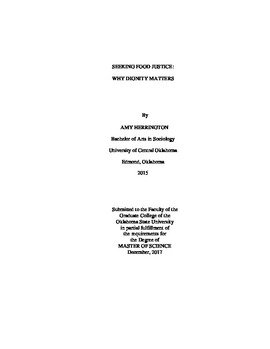| dc.description.abstract | This project expands on existing food justice research through evaluation of the ways in which dignity is related to individuals' food practices and processes. Through the process of exploring daily experiences with food, I discovered that individuals socially construct a sense of dignity through an array of food-related social processes, and as a result of social and structural forces. In light of this discovery, I provide a new theoretical model of the ways that social and structural forces influence individuals' sense of dignity, and offer a new typology of daily experiences of dignity construction within the social hierarchy of food security. Based on data from ethnographic field notes, semi-structured interviews with a sample of thirty-eight participants, and archival data, this research makes an important contribution to the literature on food justice work by exploring the social construction of dignity occurring alongside food experiences. I present evidence regarding how the social hierarchy of food security, maintained through two key aspects of structural inequality, class division and constraints to opportunities, facilitates individuals' daily, lived experiences with food access and foodways. Individuals perceive these daily experiences to either promote or violate their sense of dignity. I organize daily experiences of dignity construction into three distinct social arenas--individual, relational, and institutional. My findings suggest that as a person's position in the social hierarchy of food security rises, so, too, does the likelihood of having daily experiences that positively impact individuals' sense of dignity. The inverse is equally true. Individuals occupying lower positions in the social hierarchy have a higher likelihood of experiencing daily events that negatively impact individuals' sense of dignity. Findings elucidate a new typology of daily experiences of dignity construction within the social hierarchy of food security. The theoretical contributions provided in this paper offer a first step toward achieving a central goal of the food justice movement-- restructuring the food system to promote fairness, equality, and a greater sense of dignity for all individuals. | |
